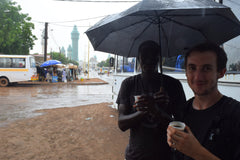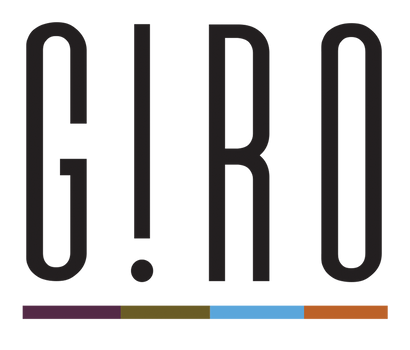G!RO // Pete's Coffee Blog // Part 1

Welcome to a brief two part look at the international coffee industry, which will hopefully prove interesting!
Part one is concerned with a general introduction to coffee production and distribution, as well as a look at the UK’s coffee drinking habits. In part two, Jordan (Giro co-owner) and Edward (our local roaster) will explain more about the coffee we serve at Giro, and what we are doing to help alleviate some of the environmental and social issues associated with the production of coffee. The aim for this series is to not simply be a thinly veiled infomercial for how amazing our coffee is, but rather a genuine look at the processes that are involved, and the avenues open to smaller, independent roasters and coffee houses.
The idea to write this was sparked by the BBC documentary which aired this recently- “The Coffee Trail with Simon Reeve” , the 2nd part in his look at where the UK get’s it caffeinated hot drinks from. After looking at Kenya’s tea production, the focus shifted to Vietnam, which, as with Kenya for tea, is not the first country that springs to mind when thinking of our major source of coffee. Yet Vietnam produces 15% of the world’s total, and around 80% of everything that is drunk in the UK. Indeed, looking at the map below (thanks Wikipedia, I knew this Masters degree was worth it), production is far more varied than the few African or South American countries one normally associates with coffee. I can’t remember ever ordering a Papua New Guinean roast for example.
(World coffee production. r:Coffea canephora m:Coffea canephora and Coffea arabica
a:Coffea arabica Source: Wikipedia)
This disparity between actual production of coffee, and “country brand association” is primarily due to the type of beans grown in different regions/countries (and advertising of course). Arabica originated in Ethiopia, and is seen as the superior of the two main beans (and as Jordan and Edward will elaborate on, the only type of bean we serve at Giro). Robusta coffee plants are hardier, require less attention from farmers and the beans contain twice as much caffeine. While also originating in Sub-Saharan Africa, it is now mostly grown in Vietnam. The higher caffeine content gives a more bitter taste, robbing drinks made using it of the subtle flavour variations achievable with arabica, and as such robusta beans are mostly turned into instant coffee or medicinal caffeine.
Which of course means, for those of you still paying attention, that if 80% of the coffee we import into the UK is from Vietnam - and therefore robusta beans - that 80% of the coffee drunk here is of the instant variety.
As mentioned in the documentary, UK coffee consumption has doubled since the 1970’s, but clearly, most of it is rubbish. In order to grow all this coffee in traditionally forested parts of the world, has obviously required substantial “redevelopment”, namely the chopping down of frankly most of the trees, and replacing them with the cash rich monoculture that is coffee.
The combined effects of overproduction, over use of fertiliser and pesticide, and the increasingly erratic weather in many parts of the world is putting a substantial strain on the ability of traditional coffee producers to continue the way they are now.
Of course, the doom and gloom outcome as highlighted in the documentary however, is not necessarily representative of the whole coffee market. While robusta beans are grown for their caffeine, as intensively as possible, the arabica market is a rather different beast. Smaller scale production, with the focus on the quality of the bean, is far more adaptable to changing conditions - and drinking fashions - and with the premium price tag attached to the beans, the opportunity for better production methods and community development to be adopted. Fairtrade or Organic certification is more likely to be attached (although you can find it in the instant world) and this brings a whole host of benefits to the growers and pickers. Both Jordan and Edward will discuss in part 2 why we have chosen to only use organic coffee, and more information on the estates and cooperatives we source from.
Leave a comment
Comments will be approved before showing up.
Also in The Coffee Bean
G!RO // Pete's Coffee Blog // Part 3
 My post-G!ro time saw me travel to Sierra Leone to lead a group of British and Sierra Leonian volunteers as part of the ICS programme. Working in Freetown's slums with at-risk youth, sex workers and the unemployed, the work was challenging but rewarding, and in many areas did indeed lead to positive, sustainable changes // Which is all well and good, but what does this have to do with coffee, I hear you ask. Sierra Leone has long grown and exported coffee, never in any great volume, or to much acclaim. Post civil-war, there have been great efforts to make the production ethical and beneficial, with examples such as this clearly pointing to a positive future for those in the eastern, coffee production areas, which were most devastated by the war. However, this has not lead to a domestic market for the stuff, with coffee in Sierra Leone, if you can find it at all, guaranteed to be a weak cup of Nescafe, lots of sugar, and powdered milk. Despite the large Lebanese community (and NGO workers), tea, or the plentiful cheap beer are far more popular.
My post-G!ro time saw me travel to Sierra Leone to lead a group of British and Sierra Leonian volunteers as part of the ICS programme. Working in Freetown's slums with at-risk youth, sex workers and the unemployed, the work was challenging but rewarding, and in many areas did indeed lead to positive, sustainable changes // Which is all well and good, but what does this have to do with coffee, I hear you ask. Sierra Leone has long grown and exported coffee, never in any great volume, or to much acclaim. Post civil-war, there have been great efforts to make the production ethical and beneficial, with examples such as this clearly pointing to a positive future for those in the eastern, coffee production areas, which were most devastated by the war. However, this has not lead to a domestic market for the stuff, with coffee in Sierra Leone, if you can find it at all, guaranteed to be a weak cup of Nescafe, lots of sugar, and powdered milk. Despite the large Lebanese community (and NGO workers), tea, or the plentiful cheap beer are far more popular.
G!RO // Pete's Coffee Blog // Part 2

All of our coffee comes from Woking, with its world famous plantations, producing the best coffee on its sun drenched slopes. Only some of that sentence is true of course, but our coffee does come via Woking, with everything we serve at Giro having been roasted by Edward at Beanberry. Small batch roasting and speedy delivery ensures optimum freshness and that means better coffee for you guys.
